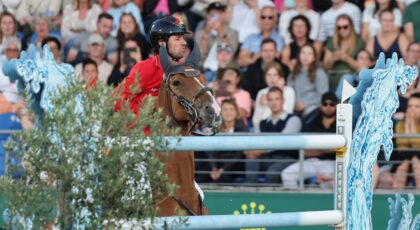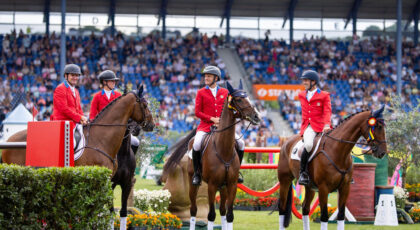As a child, I told everybody that I wanted to be a millionaire.
In America, maybe that’s not unusual. But in socialist Denmark, it made me the black sheep. I mean, we didn’t get grades in school because you couldn’t admit that someone might be better than the other. Being different there was like the worst thing you could be.
But I just wanted to do something special and I knew very early on that I did not want to stay in Denmark.
It’s funny, because now that I have achieved a certain level of success in the U.S., everybody here thinks it’s because I’m Danish that I’m so driven and running after things all the time. But that’s not the case. It’s much better to be different here than it is to be different in Denmark.
But, at the same time, it was Denmark that gave me the tools to go after my dreams.
****
I was the youngest of three kids.
My mom wrote books. She was very optimistic and sweet, but also super tenacious and clever. She had this really big education that nobody got at that time. She was like the only woman in the University of Copenhagen in the 50s. She was an unbelievable person and very loving, but she was not a very nurturing mother.
My dad was also extremely clever and charismatic and super hard working. He was a very good lawyer, the best in Europe.
Dad got really sick when I was very young. He was traveling a lot for his work, and my mom would always go with him because he couldn’t manage on his own with all his medical problems. They traveled three weeks out of the month.
From age eight, I was left alone with my siblings. When they turned 18, they moved out and then I was just alone from the age of 11.
It was a very abnormal childhood.
My dad passed when I was 18. It was a long, drawn-out illness. I think seeing how sick he was is probably why I live so intensely. That and being on my own so much as a child. It made me really independent, though I didn’t really know it at the time. There was nothing that anyone could present to me that I didn’t think I could manage on my own. Even at 11.
****
I left Denmark for the first time at 18. I came back two years later and got my education, and left again when I was 23 for America.
I remember when I arrived in New York, it was a shock. Like, my God, how am I going to make a difference when there’s so many people here? And then I thought, I’m just going to have to really buckle down and do it.
And that’s what I did.
I worked a part-time as Miss Carlsberg for the beer company, and as a rep for a watch company, then that same year, I started my own watch company, Skagen.


For 26 years, I put everything into it. I had big dreams for Skagen. I wanted it to be the biggest watch company in the world. It wasn’t. But we got big enough to be bought out by Fossil.
All those years, I never stopped thinking about horses. I rode as a child but had to stop when dad died. I always knew I’d get back to riding though. And I always knew I wanted to go to the Olympics.
With Skagen, I worked toward having enough money that I could buy horses and ride at a later point in my life. My goal was to sell that company before I turned 50 because I thought if I was under 50, I could still have a good chance of learning and being good.
In America, everyone wants you to have a passion for what you’re doing. I get asked all the time, did you always love watches?
No, I did not love watches.
It was a means to an end. I tried to sell pots and pans. I tried to sell all kinds of things. Couldn’t sell any of it. And then with these watches, it was okay, this is something I can actually do.
When I sold Skagen, everybody was tearing up and everything. And I was so happy to get rid of that thing. I was 49.

****
I started riding again when I was 35 and my kids were old enough to take jumping lessons with me. When you start riding later in life, you don’t have as much time.
I was too impatient to wait to become good at jumping. I thought, okay, I’ve got to get good at something really quickly. So then I tried dressage and that was somehow easier for me.
I got my first great dressage horse, Nintendo, in 2012, the same year I sold my company. I ended up starting a riding apparel line, Kastel Denmark, that year too after I got skin cancer from riding outside all the time and couldn’t find a UV-protective shirt line for riding. What can I say? A leopard doesn’t change its spots.
My main focus though was dressage and Nintendo really taught me how to ride. I became super good almost right away. Within a couple of years, I won the Regional Championships.
But I’m competitive, right?
I remember coming to the Regional Championship and I saw these people riding Grand Prix and thought that could be really fun. I want to try that. And so very quickly, I was like, okay, how do I get to there?
Within three years of getting Nintendo, I was riding for the U.S. I was named to my first Nations Cup team in 2015 at CDIO5* Rotterdam, helping the U.S. take home the bronze, and went to World Cup Finals the following year.


****
Some people think it’s a bit crazy, this journey I’m on. But I’ve just always been hyper focused on getting to the top—no matter what I did.
With the horses I didn’t really know the path—it was a little bit difficult to see. I didn’t really know what horses to buy. People took advantage of me. I mean, I made a shit ton of mistakes on the way.
But I also, of course, made a lot of very good and quick decisions.
And for the most part, it’s worked out. To the outside world, I’m very successful. I get these texts and messages from people every day on Messenger: “You always look so happy and your horses look so happy.” “You’re such an inspiration.” And it never gets old. I always thank them profusely and tell them that they made my day, which they usually do.
At the same time, you just get up and do your thing. You never really think of yourself as something special.
Because if I look at what I want to do and what I have done, basically none of my goals have been achieved.
I want to go to the Olympics. I’ve been shortlisted twice. But I haven’t made the team yet. I still want to go. I want to go to L.A.
But I think that’s cool, too. I don’t really let myself worry about the future because there’s nothing you can do with it. I’m just focused on what’s next.
Right now, I want to see if I can get to World Cup Finals in 2025. And then I want to double sales for Kastel. I want to be very competitive in Wellington this winter and just have a blast with all my beautiful horses and really enjoy myself.
And then I’m going to try for the 2028 Olympics.
After that, I think I want to try something completely different. I’ve been really giving this some thought because I think that once I’m done with the Olympics, or if I figure out that I can’t do it, whatever happens, I want to try one more completely different thing again.
And that could be boating. I love water. I love boats. I think maybe it’s traveling the world on the boat and doing something that would just completely get another part of my brain to work where I would learn completely different skills—how to repair the boat and sail the boat and all of that. I think that would be so much fun.
I don’t know where this absurd drive is coming from because it is a little bit at this point crazy. You know, I’m 60, and I’m running around constantly. My kids tell me to take a chill pill. I could relax a tad.
But not just yet.



 November 5, 2024
November 5, 2024 

























